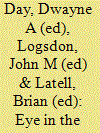|
|
|
Sort Order |
|
|
|
Items / Page
|
|
|
|
|
|
|
| Srl | Item |
| 1 |
ID:
047554


|
|
|
|
|
| Publication |
Washington, Smithsonian Institution Press, 1998.
|
| Description |
xiii, 303p.
|
| Series |
Smithsonian history of aviation series
|
| Standard Number |
1560988304
|
|
|
|
|
|
|
|
|
|
|
|
Copies: C:1/I:0,R:0,Q:0
Circulation
| Accession# | Call# | Current Location | Status | Policy | Location |
| 043553 | 327.12/DAY 043553 | Main | On Shelf | General | |
|
|
|
|
| 2 |
ID:
076850


|
|
|
|
|
| Publication |
2007.
|
| Summary/Abstract |
On July 31, 2006, after more than 47 years in power in Cuba, Fidel Castro ceded his government, Communist Party, and military responsibilities to his brother Raul. As of late April 2007, the 80-year-old Fidel had not appeared in public since ceding power, even at events designed to revere him. No new policy initiatives have been taken in his name, and no line of obsequious officials has been reported waiting at his door. Now, even as the state-controlled media continue to lionize him, Castro is transubstantiating into a historical artifact, even though he remains the official head of state. As the seasons change and the Cuban people stoically go about their business, the possibility that Fidel will return to power seems ever more remote. He has been glimpsed briefly a few times on Cuban and Venezuelan television, looking emaciated and confused following complications from as many as three major intestinal surgeries…Cubans have seen and heard a pallid, vacated version of the previously acute and always voluble Fidel, the familiar grandstanding figure who for so many years posed and strutted on the world stage.
Some foreign observers in Havana have concluded that these appearances have been choreographed at least in part by his successors to dampen whatever expectations may be left that Fidel will be able to fully function again in office. Nothing of what was seen of his diminished physical condition seemed calculated to reassure those who hope for his return. Although he could yet reappear in the halls of power in Havana, the evidence of his physical debilitation and cognitive inconsistencies suggests that if he does return, it will be in an emeritus capacity. In fact, the new leadership and probably the bulk of the Cuban people seem to have moved on, relieved to no longer endure his endless monologues while suppressing all hope of relief from his strangling ideological intransigence. There is even reason to suspect that Raul and others around him do not want Fidel back. For example, surely it was not happenstance that Raul commented, perhaps in jest and perhaps not, in an impromptu discussion he initiated with foreign reporters in Havana in February 2007 that although his brother speaks by phone with other government officials, "it is my good fortune that he never calls me."
The fading Fidel still has many ardent followers on the island. Yet, most Cubans have high expectations that his abdication will soon make important changes possible. They have been feeling the first blush of hope that a more tolerant, economically liberalized, outwardly oriented era may be dawning. In a departure from Fidel's standard rhetoric, for example, the new regime is admitting that the country's economic problems are systemic, the results of corruption, inefficiency, and overly rigid central planning. Internal scapegoats and the U.S. economic embargo are no longer incessantly being blamed. Previously persecuted groups, including intellectuals, artists, and homosexuals, as well as deeply disaffected youth are beginning to see in Raul the makings of a Communist reformer. It is not yet clear, however, whether or not those hopes will be viciously dashed.
In early April 2007, his regime began implementing a tough new labor code intended to wring corruption, inefficiency, and malfeasance out of the workplace. Other measures to extirpate illegal satellite television antennas and to restrict Internet use to the approximately 2 percent of the populace now with access have also demonstrated the new regime's determination to maintain absolute political control. Raul has often in the past taken the lead in implementing such unpopular, draconian measures. As a result, he is mostly hated and feared by the Cuban people, remembered as his brother's most brutal executioner and hard-line enforcer. Unlike Fidel, he is dour and uncharismatic and will therefore have difficulty softening his image or making restrictive new policies seem palatable to the populace
|
|
|
|
|
|
|
|
|
|
|
|
|
|
|
|
|
|
|
|
|